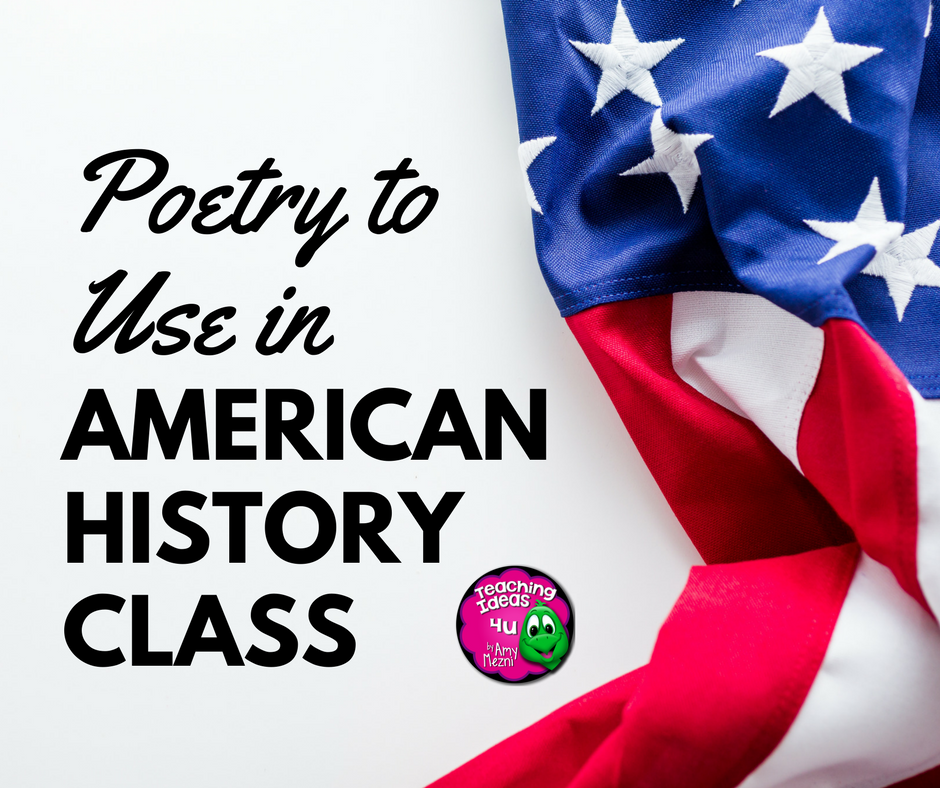Poetry to Use in Your American History Class
Understanding poetry is an important skill for students to learn, but if your students are like mine many of them "hate" poetry. From experience I can tell you most of the groans come from students who don't really know what poetry is. In addition, a lot of poetry is taught in isolation - a once a year poetry unit, and then kids never see it again. Instead of the once a year unit, try integrating poetry into your American history units!
Throughout history, people have used poems for a variety of reasons. Some poems have been written to commemorate an important event (such as a war), as protests, to honor religious beliefs, and to reflect people's thoughts. All of these could be used to better understand historical time periods.
To help you integrate poetry into your units, here is a collection of poems and poets by American History time period. As always, please read the poems and make sure they are appropriate for your students.
Colonial Times
Anne Bradstreet - "Prologue" and "To My Dear and Loving Husband"
Revolutionary War
Ralph Waldo Emerson - "Concord Hymn"
Henry Wadsworth Longfellow - "Paul Revere's Ride"
Phillis Wheatley - "His Excellency General Washington"
War of 1812
Oliver Wendell Holmes, Sr. - "Old Ironsides"
Mid-Nineteenth Century
Ralph Waldo Emerson - "The Sphinx"
Emily Dickinson - "Because I Could Not Stop for Death"
Civil War
Walt Whitman - "O Captain, My Captain" and "When Lilacs Last in the Dooryard Bloom'd"
Herman Melville - "Misgivings" and "Ball's Bluff: A Reverie"
Hanford L. Gordon - "Only a Private Killed"
Camp Meeting Poetry - veterans would gather and share their poems. A good example of this is by Adjutant Byers 5th Iowa Cavalry - "Sherman's March to the Sea"
A book of these poems is From Odes, Hymns, and Songs of the GAR collected by James Henry Kyner.
For a Confederate viewpoint, try Henry Timrod, who is often called the poet laureate of the Confederacy. "
Ethnogenesis," "A Cry to Arms," "The Two Armies," and "Carolina"
Late Nineteenth Century
Walt Whitman - "I Hear America Singing"
Emma Lazarus - "The New Colossus"
Cowboy Poetry - Cowboy Poetry is still written today, so there are historical poems as well as contemporary ones. Here are two poems from the early 20th century:
Arthur Chapman - "Out Where West Begins"
Bruce Kiskaddon - "When They've Finished Shipping Cattle in the Fall"
This website has a collection of classic cowboy poems: Cowboy Poetry
World War I
Wilfred Owen - "Arms and the Boy" and "
Dulce et Decorum Est"Irving Berlin - (lyrical songs) - "Reveille: Oh How I Hate to Get Up in the Morning
"TS Eliot - "The Waste Land"
Alan Seeger - "I Have a Rendezvous with Death"
WarPoets.org.uk is an excellent resource for poetry from WWI.
Early 20th Century
Robert Frost - "The Road Not Taken"
Carl Sandburg (Chicago Poet) - "Fog"
Woody Guthrie (Great Depression) - "All You Fascists"
Edna St. Vincent Millay - "The Ballad of the Harp-Weaver" and "Recuerdo"
Harlem Renaissance
James Weldone Johnson - "Lift Ev'ry Voice and Sing"
Langston Hughes - "Dreams," "The Negro Speaks of Rivers" and "I,Too" "I, Too" is often paired with Whitman's "I Hear America Singing" for analysis.
Claude McKay - "If We Must Die
"W.E.B. Du Bois - "My Country 'Tis of Thee"
World War II
Richard Wilbur - "First Snow in Alsace"
Randall Jarrell - "The Death of a Ball Turret Gunner"
Gwendolyn Brooks - "Negro Hero"
WarPoets.org.uk is an excellent resource for poetry about WWII.
Holocaust Poetry
Sudeep Padegar - "Tale of a Sprinter, in the Winter of 1938"
Barbara Sonek - "Holocaust"
Cold War/1950s & 1960s
This was the time of the Beat Poets and Protest Singers.
Jack Keroauc - "Mexico City Blues (113th Chorus)"
Allen Ginsberg - "A Supermarket in California"
LeRoi Jones (Amiri Baraka) - "Legacy" and "Valery as Dictator"
Mary Oliver - "Hummingbird" and "This Morning Again It Was in the Dusty Pines"
Civil Rights
Dudley Randall - "Ballad of Birmingham"
Sam Bradley - "African in this Different Land"
Etheridge Knight - "For Malcolm, A Year After"
Nikky Finney - "Dancing with Strom"
Natasha Trethewey - "History Lesson"
Angela Jackson - "Miz Rosa Rides the Bus"
Nikki Giovanni - "Rosa Parks"
Jacqueline Woodson - "February 12, 1963"
Vietnam
WarPoets.org.uk is an excellent resource for poetry about the Vietnam War.
9/11/Terrorism
Wislawa Szymborska - "Photograph from September 11"
Rachel Zucker - "Saturday, Sunday, Monday, Tuesday"
Stephen Dunn - "Grudges"
Deborah Garrison - "I Saw You Walking"
David Lehman - "World Trade Center"
Iraq/Afghanistan
Brian Turner - "2000 lbs" and "What Every Soldier Should Know" Do you use any poets in your history lessons? If so, leave a comment and let me know what your favorite poems are! Thanks!

